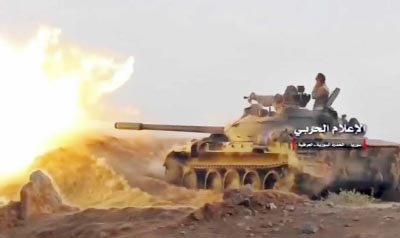
AP, Washington :
The United States and Russia are nearing an agreement on Syria for how they hope to resolve the Arab country’s civil war once the Islamic State group is defeated, officials said Thursday.
If clinched, the deal was expected to be announced by President Donald Trump and Russian President Vladimir Putin in Vietnam on Friday, four U.S. officials said. The United States has been reluctant to schedule a formal meeting for the leaders unless they have a substantive agreement to announce.
But White House press secretary Sarah Huckabee Sanders said Friday that they won’t hold a formal meeting due to scheduling conflicts on “both sides.” Still, Sanders said it was possible Trump and Putin could have a less formal encounter while in Vietnam.
The potential understanding comes as an array of forces are near a final defeat of IS, the extremist group that once controlled vast stretches of both Iraq and Syria. Fighting the group is no longer top priority, shifting the focus back to Syria’s intractable conflict between President Bashar Assad’s government and rebels – and to concerns that foreign powers such as Iran will now dominate the country’s future.
The U.S.-Russian agreement being discussed would focus on three elements, officials said: “deconfliction” between the U.S. and Russian militaries, reducing violence in the civil war and reinvigorating U.N.-led peace talks. The officials weren’t authorized to discuss the deliberations and requested anonymity.
The U.S. and Russian militaries have maintained a “deconfliction” hotline for years to avoid unintended collisions and even potential confrontations as they each operate in Syria’s crowded skies. A heavy air campaign by Russia has been credited with shoring up the position of Assad, a close ally of Moscow.
With IS nearing defeat, the U.S. and Russia are losing their common enemy in Syria and will remain in a proxy battle in which Russia backs Assad and the U.S. lends at least rhetorical support to armed opposition groups fighting the government. That has increased the need for close communication between the two powers about where their forces are operating at any given time, officials said.
The United States and Russia are nearing an agreement on Syria for how they hope to resolve the Arab country’s civil war once the Islamic State group is defeated, officials said Thursday.
If clinched, the deal was expected to be announced by President Donald Trump and Russian President Vladimir Putin in Vietnam on Friday, four U.S. officials said. The United States has been reluctant to schedule a formal meeting for the leaders unless they have a substantive agreement to announce.
But White House press secretary Sarah Huckabee Sanders said Friday that they won’t hold a formal meeting due to scheduling conflicts on “both sides.” Still, Sanders said it was possible Trump and Putin could have a less formal encounter while in Vietnam.
The potential understanding comes as an array of forces are near a final defeat of IS, the extremist group that once controlled vast stretches of both Iraq and Syria. Fighting the group is no longer top priority, shifting the focus back to Syria’s intractable conflict between President Bashar Assad’s government and rebels – and to concerns that foreign powers such as Iran will now dominate the country’s future.
The U.S.-Russian agreement being discussed would focus on three elements, officials said: “deconfliction” between the U.S. and Russian militaries, reducing violence in the civil war and reinvigorating U.N.-led peace talks. The officials weren’t authorized to discuss the deliberations and requested anonymity.
The U.S. and Russian militaries have maintained a “deconfliction” hotline for years to avoid unintended collisions and even potential confrontations as they each operate in Syria’s crowded skies. A heavy air campaign by Russia has been credited with shoring up the position of Assad, a close ally of Moscow.
With IS nearing defeat, the U.S. and Russia are losing their common enemy in Syria and will remain in a proxy battle in which Russia backs Assad and the U.S. lends at least rhetorical support to armed opposition groups fighting the government. That has increased the need for close communication between the two powers about where their forces are operating at any given time, officials said.

